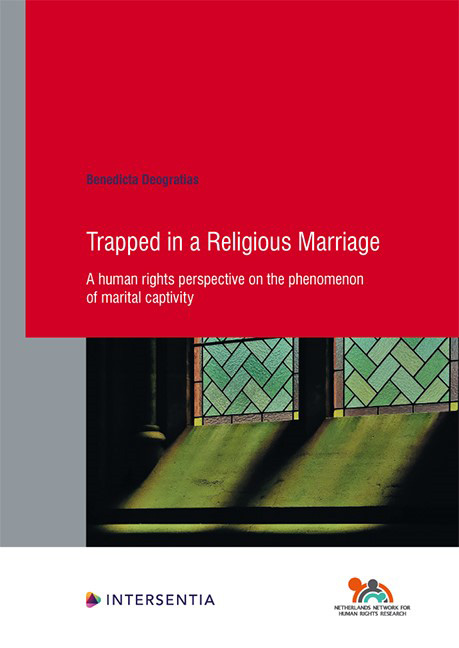Book contents
- Frontmatter
- Contents
- List of Frequently Used Abbreviations
- Chapter 1 Introduction to Marital Captivity
- Chapter 2 Religious Barriers to Divorce
- Chapter 3 Marital Captivity in the Netherlands
- Chapter 4 Marital Captivity and the Freedom of Religion
- Chapter 5 The Right to Divorce
- Chapter 6 The Trapped Spouse’s Rights
- Chapter 7 Violence Against Women
- Chapter 8 Conclusions
- Bibliography
- Curriculum Vitae
- Human Rights Research Series
Chapter 6 - The Trapped Spouse’s Rights
Published online by Cambridge University Press: 22 December 2020
- Frontmatter
- Contents
- List of Frequently Used Abbreviations
- Chapter 1 Introduction to Marital Captivity
- Chapter 2 Religious Barriers to Divorce
- Chapter 3 Marital Captivity in the Netherlands
- Chapter 4 Marital Captivity and the Freedom of Religion
- Chapter 5 The Right to Divorce
- Chapter 6 The Trapped Spouse’s Rights
- Chapter 7 Violence Against Women
- Chapter 8 Conclusions
- Bibliography
- Curriculum Vitae
- Human Rights Research Series
Summary
As the aforementioned national case law illustrates, situations of marital captivity come in many different forms. The severity, legal and/or social impact and lived experiences, thus, are unique to each single case of marital captivity. The acquired social and legal status of ‘married’ or ‘divorcee’ are not merely expressions and confirmations of one's legal identity, but they are also social constructions that continuously shape an individual's social identity and status. A limping personal status or having the status of being legally and or religiously married thus affects the way in which individuals navigate through their social environment and interact with their community members. Consequently, the unsettled marital status of a trapped spouse may produce unnecessary restrictions for their effective participation in social and community life and it may impair their personal development. So long as the still existing (religious) marriage has significant legal and/or social significance, it will continue to undermine the trapped spouse(s)’ ability and capacity to autonomously shape their lives. The autonomy of a trapped spouse, or rather the lack thereof, is the main and recurring deprivation in all situations of marital captivity.
In the following subchapters, the autonomy and the human rights of trapped spouses are discussed. As the trapped spouses are primarily restricted in their autonomy in respect of shaping their lives, subchapter 6.1. opens with an explanation of the notion of ‘personal autonomy’ and how it translates into specific human rights provisions. The substantive human rights provisions are then given further attention in subchapter 6.2. In this regard, the right to remarry, the right to respect for private life, the right to freedom of movement and the right to health are analysed, as these are all likely to be affected by a situation of marital captivity. The inclusion of the selected substantive human rights is an imperative step for generating a better understanding of the State's role in addressing situations of marital captivity. The State's obligations inherent within these rights and the extent of these obligations to protect the trapped spouse(s)’ rights are outlined in subchapter 6.3. The findings are, then, summarised in subchapter 6.4.
- Type
- Chapter
- Information
- Trapped in a Religious MarriageA Human Rights Perspective on the Phenomenon of Marital Captivity, pp. 191 - 250Publisher: IntersentiaPrint publication year: 2020

